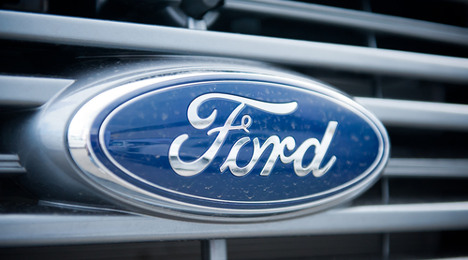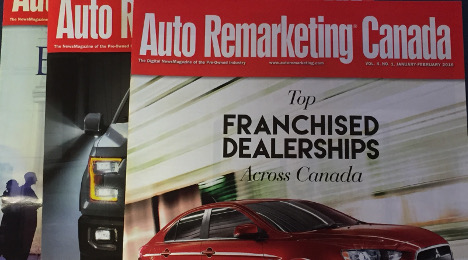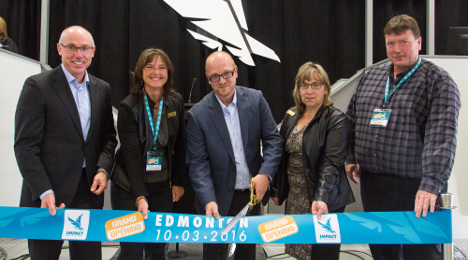Canadian tech startup TradeRev introduced two new plans for dealers this month, including a subscription-based service crafted just for high-volume users and works to streamline the resale process.
The mobile car auction app provider said it wanted to two different plan options for its dealer clients because its user base has expanded to 3,000 plus dealers throughout Canada and the U.S. in recent years.
“We’re pleased to introduce new customized plan options to better serve the diverse needs of TradeRev’s mobile app users,” Mark Endras, TradeRev president and co-founder, said in a news release.
TradeRev said the two plans are “designed to serve the needs of both high- and low-volume dealers — while simplifying the accounting process.”
For high-volume dealers, TradeRev now offers the Pro Plan, a new subscription-based service that guarantees payment in 48 hours.
It’s a research tool that provides users with details such as the make, model, and trim of a vehicle as well as sold price, location and high-value option codes.
Payday, a new incentive launched TradeRev that allows dealers to earn money back when they reach specific sales milestones comes with the plan.
Along with an enhanced billing process that is easier to use, according to TradeRev, dealers also have access to advanced research tools such as the ADESA Market Guide, which aims to reduce launch fees.
TradeRev said it has updated and customized its Standard Plan for smaller dealers who want to “test drive before signing up for a subscription.
Premium features in the Pro Plan aren’t available with the plan but users can buy, sell and appraise vehicles for free.
“Thousands of Canadian dealers rely on our real-time car auction technology, and their feedback and input led the design of our new Pro and Standard plans. Both plans simplify the billing process, making it faster and easier for dealers to get true market value for their trade-ins,” Endras said.
Ford of Canada has revealed its 2016 Auction Quality Award winners, recognizing ADESA Montreal for the second straight year in the Group A category and honoring Manheim Montreal in the Group B category.
This marks Manheim’s first time winning the award since joining the Ford of Canada auction program in 2013.
The Auction Quality Award groups are based on size: Group A is for larger auctions with Group B consisting of smaller auctions hosting Ford-sponsored sales.
Auctions are evaluated on various physical and operational metrics throughout the year.
ADESA Montreal earned a score of 4.42 out of 5, while Manheim Montreal earned a score of 4.33 out of 5.
All of ADESA’s Canadian auctions and Manheim’s Toronto and Montreal auctions took part in the 2016 Auction Quality program. The program itself has been going on for more than 20 years.
Simon Robitaille leads ADESA Montreal, while Christina St-Germain leads Manheim Montreal
“We are extremely proud of the level of service provided by our auction partners last year. These auctions play an important role in our ability to deliver an exceptional experience to our used vehicle customers,” Ford of Canada remarketing sales manager Doug Collis said in a news release.
“The services provided by both ADESA and Manheim instill confidence for our dealers that they are making the best selections of pre-owned vehicles for sale at their dealerships,” he said.
ADESA announced on Friday it has promoted a new general manager of its Saskatoon, Saskatchewan auction.
Chosen for the role is Kevin McCaig, who was most recently an ADESA Saskatoon sales manager.
“Kevin has been an essential member of the team at ADESA Saskatoon, and he has played a valuable role in this auction’s success as it has grown from a three-lane operation into an eight-lane facility,” said ADESA senior vice president of Canadian operations Gregg Maidment in a news release. “Kevin was instrumental in helping the team at ADESA Saskatoon earn Auction of the Year honors for Canada and for all of North America in 2015.”
McCaig transitioned into sales management positions after joining ADESA Saskatoon in 2006 as a factory account representative.
In 2008, McCaig was responsible for opening a satellite branch in Saskatoon when he served as site manager for Automotive Finance Corp.
AFC, a subsidiary of KAR, is a capital funding source that provides inventory financing and comprehensive business services to car dealers.
McCaig returned to the auction as sales manager in 2009.
“I am confident that he has the leadership skills and experience to continue to grow this auction’s market share while maintaining a positive and productive customer experience,” Maidment added.
McCaig also serves as an auctioneer at ADESA Saskatoon. In 2010, he attended the World Wide College of Auctioneering.
Two years after opening its second location in Moncton, Canadian Auction Express traded it for a larger site nearby.
The new location, at 72 Urquhart Ave., has three lanes featuring state-of-the-art simulcast equipment and top-notch auction software, an 8,000-square-foot building and 5 acres of parking.
Last week’s grand opening attracted buyers from as far away as Ontario and Maine, in addition to online buyers from throughout Canada and the U.S.
"We have build a dream team of people and sell vehicles each Thursday all over North America," said Gord McComb, president.
CAE also announced the addition of Arnold Lee to its team to help grow the auction’s commercial customer base.
Lee spent the last 12 years heading up Financialinx and GM Financial in addition to many years in the leasing and rental industry.
Attention, auto auctions: Auto Remarketing Canada is putting together an “Auction Life” photo spread for our next print issue.
If your auction or auction group would like to participate, submit photos via email to senior editor Joe Overby at [email protected] no later than close of business on Monday Nov. 21.
If you are sending large or multiple pictures, a zip file or a site like Dropbox might be better.
These photos can run the gamut: We want to see everything from the daily business operations and sales days to the life and fun that occurs at your auction (for example: cookouts, special events, holiday parties, team-building activities, etc.).
They will need to be in high-resolution, JPG format.
Please send captions, if they are available, as well. And while we strongly encourage these photo submissions, we won’t be able to print every photo. However, as a bonus, we will also be running some photos in our digital version of the magazine as an Online Extra.
For reference, here is an example of an Auction Life photo spread from our U.S. version of Auto Remarketing.
When it comes to a full-fledged rebound in Canadian used-car supply, the consensus seems to be: Not quite yet.
“That’s at least a year off,” Tom Kontos, chief economist of ADESA Analytical Services, said when Auto Remarketing Canada reached out to him and other analysts in September. “The biggest ‘swing vote,’ if you will, comes from leasing. With that still a bit down, I don’t expect the recovery in used-car volume to hit until sometime in 2017.”
And with Canadians taking on longer lease terms, “That kind of pushes out the recovery of off-lease volume, which is a big portion of all the used-car volume that we would see at the auction,” Kontos said.
The onset of the recession in 2008 put a big dent in leasing volume in Canada. Prior to the recession, lease penetration was about 40 percent of all new-vehicle sales.
Brian Murphy, vice president of research and editorial with Canadian Black Book, echoed Kontos’ sentiment in saying that much of the recovery hinges on “the fundamental return to leasing.” When reached in September, he noted that lease penetration sat at about 25 to 26 percent — double the low of 12 to 13 percent toward the end of 2010.
Kontos said lack of equity also plays a role in supply shortages. During the recession, he pointed out, many Canadians started buying their cars with longer-terms loans: up to 72 months.
“The longer the term, the harder it is to get ‘right side up,’” he said. “That puts a lot of people outside an equity position, which means they’re not going to trade that car in for a while. That’s another would-be source of used supply.”
Geoff Helby of ALG agreed that next year is when we’ll see a full recovery in used supply.
He believes that current growth in new-vehicle sales along with higher lease penetrations are on track to ease used-vehicle inventory constraints.
And leasing is on the upswing, he said, noting a 27-percent lease penetration industrywide when reached by Auto Remarketing Canada.
“Luxury is sort of maintaining, if you will, but growth from 2014 onward has been in the mainstream,” particularly Hyundai and Kia, he noted.
ALG predicts 485,000 vehicles may come off lease this year — still well below 605,000 in 2010.
Also this year, Helby said, will be a restoration in the shortage of 3- to 4-year-old vehicles. This year and next, we’re seeing an excess supply of 1- to 2-year-old vehicles, and through 2018, we’ll see declining supply of 5- to 7-year-old vehicles.
Dennis DesRosiers of DesRosiers Automotive Consultants also asserted that record auto sales along with a rebound in leasing rates and a healthy fleet supply have helped to normalize used supply — even in the face of continued U.S. exports.
“We expect to see supply explode over the next few years,” he said.
According to data provided by DesRosiers, total off-lease and off-fleet supply hit a post-recession low of 432,044 in 2013 and is expected to be back up over 800,000 — as was the case prior to 2012 — sometime between 2018 and 2019. This year, the figure is forecast to be 620,276.
Demand from U.S. buyers
Eating into Canadian supply has been a healthy U.S. appetite for used vehicles spurred by a favorable exchange rate.
So is demand from southern neighbors still strong?
“With the dollar in the mid- to high 70s, it certainly attracts a number of U.S. buyers,” Helby said.
“The dollar tanked early this year for a very short time in late January; we bottomed at about 68 cents. It’s bounced back about a dime since then. That affects U.S. buyers,” Helby said. “The other thing we have to consider now is there’s a longer waiting period at the border, which is starting to cause U.S. buyers to pull back.”
And as the U.S. sees more of an excess used supply situation, that is going to curb the appetite of some U.S. buyers, he pointed out.
“There are still U.S. buyers that are coming here and purchasing. But they have specific needs, specific appetites.”
Murphy said that Black Book’s auction spotters are seeing U.S. demand for larger trucks and SUVs.
Kontos pointed out that even with a strong U.S. dollar, more buyers may be opting to stay south of the border.
“A lot of people put U.S. buyers as a dynamic that is driven by exchange rates, but that’s not the only factor,” he said. “Another key factor is the softening wholesale market in the U.S. will keep more buyers in the U.S., even if the U.S. dollar stays strong. If you can meet your needs without going outside of the country, you’re going to do that.
“A dealer is going to think twice if prices are fairly economical at home. That dynamic is still there but it’s waning a bit. It peaked in the last several months. Now the market in Canada is more driven by the Canadian dealers without as much input from U.S. buyers.”
Wholesale prices
So what can we expect as supplies rebound and prices soften?
In its June Risk Outlook report, RVI Group predicted that used-car prices will fall 16.5 percent by 2019, with pressure starting to build in 2017.
“As far as lease supply versus the foreign exchange rate, we see this having similar impacts downward on future car prices,” Wayne Westring, manager for RVI Analytical Services at RVI Group, told Auto Remarketing back in June, noting that of those two factors, growing off-lease supply would have the bigger impact.
As leasing gains ground in Canada, there’s one thing people should be asking.
“The golden question I think is, what happens to those vehicles?” said Murphy. “Does the OEM captive lender have a plan to divert that vehicle? Is it bought by the grounding dealer? Is it sold in a closed auction to other dealers and put into a CPO program or are they going to put the vehicle out to auction?
“Cars coming back from lease are already happening,” he continued. “But what happens to those cars?” Murphy said it’s Black Book’s opinion that residuals will be trending downward.
“My view is that this time next year, prices will be lower than they are today. It’s just because of better supply.”
Officially opening what company officials called the largest of its kind in Canada, Impact Auto Auctions on Monday welcomed more than 250 auto industry professionals and local dignitaries at the grand opening of its new Edmonton auto salvage auction facility.
The new facility for the subsidiary of Insurance Auto Auctions, a business unit of KAR Auction Services, is located at 26419 Twp. Road 525A in Acheson, Alberta. The operation features 47 acres of vehicle storage and 12,500 square feet within the office, auction and inspection building.
“Today we continue our expansion in northern Alberta with the official opening of our largest facility to date,” Impact managing director Terry Daniels said.
“We are extremely excited about delivering an enhanced service experience to our customers in this market, and look forward to continuing our support of the greater Edmonton business community and our local community partners for many years to come,” Daniels continued.
Designed with an elevated customer experience in mind, Impact Edmonton features a large buyer reception and service area, a series of dedicated appraisal offices, and Impact's dual auction lane configuration which is geared to save buyers time by enabling them to safely view multiple auction vehicles at once.
The new site also increases the company's vehicle capacity in the market by 50 percent, enabling Impact to consolidate its greater Edmonton operations into a single facility.
“On behalf of Parkland County Council, we are pleased to welcome Impact Auto Auctions to Acheson,” mayor Rod Shaigec said.
“Acheson is a growing industrial hub just west of Edmonton and home to a variety of growing businesses,” Shaigec continued. “We’re looking forward to building a great relationship with Impact and working together to enhance the local economy.”
Supporting local communities is a priority for Impact and as part of the grand opening celebrations, Impact donated $10,000 to the local Canadian Red Cross which continues to support families and individuals recovering from the Fort McMurray wildfires.
Over the summer, Impact employees also worked with local authorities to remove more than 1,000 vehicles in the region, an essential first step in beginning the cleanup and rebuilding effort in the community.
For additional information about the facility, contact Michelle Mullins, Impact's Western Regional Manager, at [email protected] or visit www.impactauto.ca.
Canadian wholesale vehicle prices in August were down an average of 0.3 percent from July, according to the report accompanying the latest ADESA Canada Used Vehicle Price Index.
The report — powered by ALG — indicates that the ADESA index was up after seasonal adjustments.
As far as individual segments, the most notable changes were in minivans, whose prices fell the furthest from July (down 5.9 percent), and midsize SUVs, which showed the most price growth (up 6.1 percent).
Mid-compacts were down 0.8 percent and midsize vehicle prices dropped 2 percent. Compact SUV prices fell 2.4 percent.
Full-size pickups were up 1 percent.
If Canadian dealers have watched what’s happened within the wholesale market in the U.S., they likely have an inkling of what's coming down the lanes from British Columbia to Nova Scotia.
Chief economist Tom Kontos summarized his recent presentation during ADESA Canada’s client advisory board meeting as a part of his monthly Kontos Kommentary that recapped wholesale activity in the U.S.
“In a nutshell, the Canadian remarketing industry is currently where the U.S. was a couple of years ago when supplies were tight and wholesale values were high,” Kontos said. “Just as it has in the U.S., used-vehicle supply will likely begin to come back in Canada, and prices will gradually soften.
“Moreover, the softening of prices in the U.S. will likely keep more U.S. buyers at home as opposed to going north to buy Canadian units,” he continued.
“The combination of increased supply and declining U.S. buyer demand will likely cause wholesale values in Canada to gradually soften over time just as they have in the U.S.,” Kontos went on to say.
Wholesale prices in Canada in April were down an average of 0.6 percent from March, according to a report accompanying the latest ADESA Canada Used Vehicle Price Index, powered by ALG.
Kontos' latest update about U.S. wholesale data can be reviewed here. The video where Kontos discussed Canada can been seen in the window at the top of this page or by going here.
Senior editor Joe Overby contributed to this report.
Copart Canada has launched a website tailored to its Canadian members.
The site, copart.ca, continues to use Copart’s proprietary VB3 auction technology while further enhancing members’ experience with Canadian inventory and content.
“It’s really exciting to launch copart.ca, a site specifically for our Canadian members, on Canada Day,” Steve Macaluso, managing director of Copart Canada, said in a news release from Friday. “This new website is an investment to better serve our Canadian members with direct and easy access to the inventory that is available at our six auction locations across Canada.
“The new website is also available in French and will exclusively feature Canadian-specific content,” he continued.
Copart Canada members will now have access to weekly Canadian auction updates, specialty auction announcements, and updates on industry news and regulatory developments.
“We are committed to providing our members with a great selection of vehicles using our industry-leading auction technology in a safe and transparent online marketplace,” said Macaluso.
Previously, Copart Canada has operated on the Copart.com website where all Canadian inventory was included with inventory located across North America. Copart’s Canadian inventory will remain available on Copart.com to appeal to Copart’s broad international member base.
Copart Canada operates in Edmonton, Calgary, Toronto, London, Montreal and Moncton.












